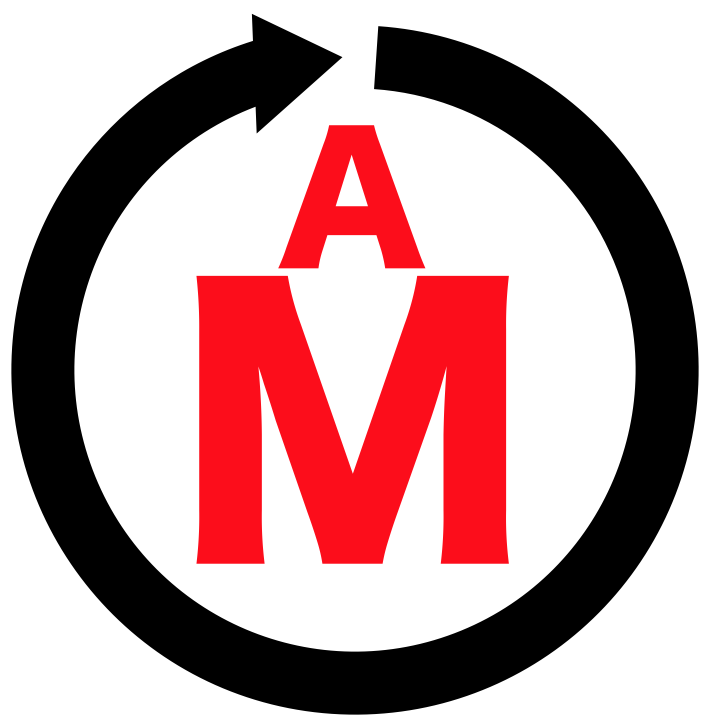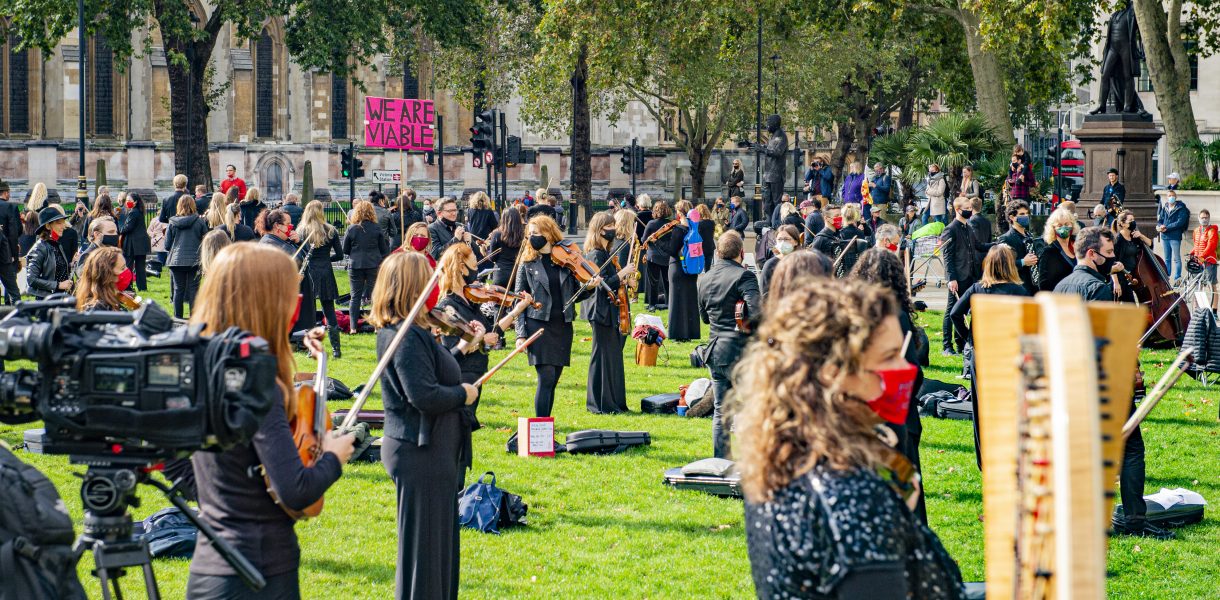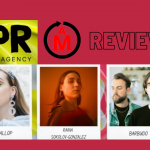“We are here, and we are viable, and we are ready to work. Help us find a way!”
Jessie Murphy
For the creative industries (and indeed the entire world), it would be an understatement of epic proportions to describe 2020 as having been anything other than tough! For musicians and those involved in live music, the inability to perform to physical audiences or gather in close proximity has left freelancers across the board facing great hardship and uncertainty. Due to the nature of freelance work, many of these individuals have also fallen through the gaps regarding Governmental financial support leaving many financially vulnerable and forced to consider retraining.
On 6th October 2020, 400 freelance musicians gathered on Parliament Square in a potent and rousing demonstration of protest. Socially distanced and fully masked, they proceeded to play “Mars” from Gustav Holst’s The Planets Suite in the hope of conveying to Parliament the value of their profession. With the Arts and Culture industries reportedly contributing a staggering £10.8bn a year to the UK economy (with music making up £5.8bn of that figure) there was a strong sentiment amongst those protesting that where the arts are concerned, there continues to be a significant misunderstanding of the value of creative work and the ways in which creative professionals conduct business.
In late November, co-founder of AM Hermione Kellow had the pleasure of speaking to Violinist Jessie Murphy, mastermind behind the #LetMusicLive protest. They discuss what inspired the protest, what it hoped to achieve and start to dispel some of the mystery around life as a freelance musician.
Hi Jessie, thanks so much for talking to us here at Apocalypse Music! Tell me, why you were initially inspired to start #LetMusicLive?
By the end of May 2020, all of the touring, sessions, and live work I had booked in this year had been cancelled, so I tried to find other ways to work. My violin duo partner and I recorded promo videos outside, masked, to show we could provide safe live music for smaller events and weddings etc. In August, we had a handful of wedding bookings but these were cancelled when the number of guests allowed at weddings changed. In Sept/October we had a few small events that we were on the horizon, but when the rule of six came in, they obviously couldn’t go ahead either.
The Government had worked hard with many sectors (e.g. sport, restaurants, hairdressing and personal care) to help them find a way to open safely, yet our industry’s plight had not been addressed. The self-employment scheme had stopped at the end of August and the Government was treating us as though we were able to return to our jobs, yet musicians and freelancers across the creative industries were essentially still in lockdown as far as work was concerned! There had been huge investment in buildings and institutions, but the freelancers who work in them were being ignored or perhaps misunderstood. We were being dismissed as ‘unviable’. I wanted to find a way to say “we are here, and we are viable, and we are ready to work. Help us find a way!”
So how did the idea for the protest come about?
I put a post on Facebook that said “Let’s not take this lying down, I feel like standing outside Parliament and playing the “Rite of Spring” until they hear us, who’s up for it!?” Almost immediately lots of wonderful people volunteered to play and help organise. We formed a Facebook group and within a week there were over 2,000 members! There was such an overwhelming strength of feeling among our friends and colleagues.
Due to Covid restrictions we had to limit numbers at 400 and Violinist Clare Raybould, invented an incredibly detailed Grid system to ensure that social distancing was observed and that we could still hear each other well enough to play together! We chose the 6th of Oct and various, amazing people from the industry volunteered to help organise it all, some who I knew well and some I’d never met before. Nicola Benedetti, Tasmin Little and Emma Johnson offered their incredible support and came along on the day, to be interviewed, the Bennedetti Foundation sponsored 200 red masks, made by We Make Events! Chloe Millar and Amy Thomas organised a brilliant, simultaneous demonstration in Birmingham, Centenery Square.
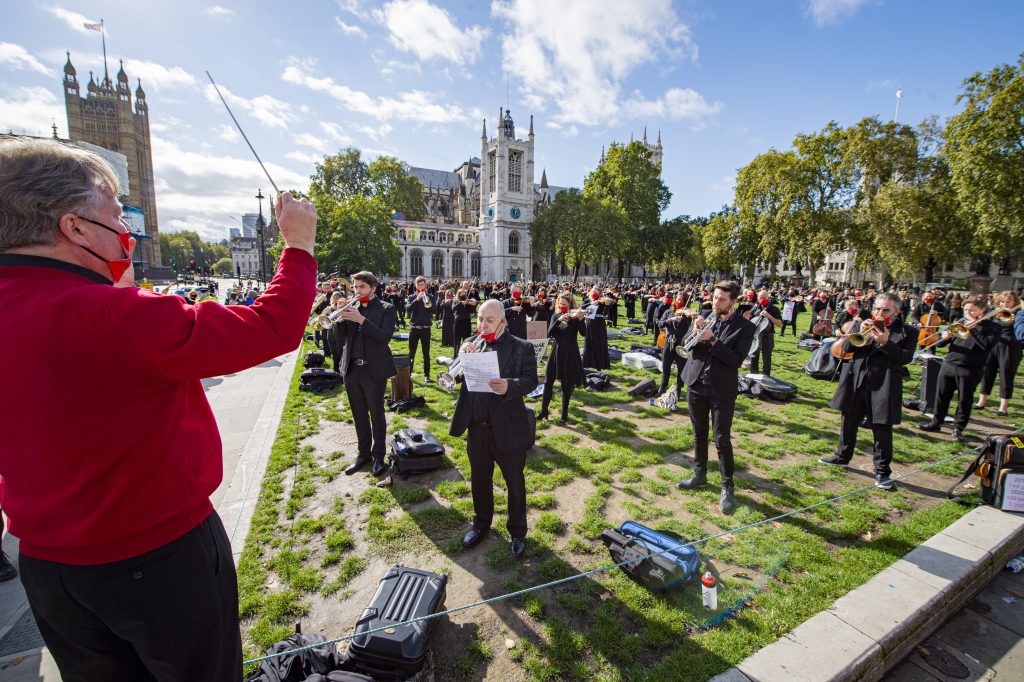
How about your collaboration with #WeMakeEvents?
We wanted to contact We Make Events from the outset as they had been doing such amazing work over the summer. I put out a few feelers and then Gary White called me and told me about all the incredible stuff they had been doing and what they are planning, he was so kind, passionate and supportive. He said we could come under their banner and they were absolutely wonderful, especially with police restrictions and ensuring everything was covid safe. Obviously, it was of paramount importance that it was totally professional, socially distanced and well organised. We wanted to come together, make something beautiful and meaningful happen, and then disperse, in absolute safety.
The protest that took place on the 6th October on Parliament Square attracted loads of media attention, how was the day for you?
I remember feeling so emotional just at the sound of tuning up, and when we started it almost shocked me that we all could still do it! I remember one of the Brass players saying afterwards that he had forgotten what that string sound felt like up close, and actually that was really (in its purest form) what we set out to do. To show that what we are trained to do, and what we love doing, is a beautiful thing. It’s not a business that is ‘no longer viable’, it’s an art and a beautiful form of human expression. It felt so exhilarating and life affirming, just to play together after so long!
There was an amazing coming together of fortuitous events. We played the opening of “Mars” from The Planets and it just so happened that on Oct 6th, Mars was the closest it was going to be to Earth for the next 22 years! Rishi Sunak made the ‘retraining’ comment in an interview at almost the same moment as we were playing, which sparked quite a lot of comment on the subject, notably from Liam Gallagher! I think we made the lunchtime, 6-O’clock news and the 10-O’clock news, BBC and Sky, and C4. We couldn’t believe the coverage it got, at one time it was trending above the Conservative party conference on Twitter! We had asked some of our friends to come along and take a little bit of footage for us as well and some of their videos had around 2,000 shares in a day. So actually the impact was far more than I dared imagine possible.
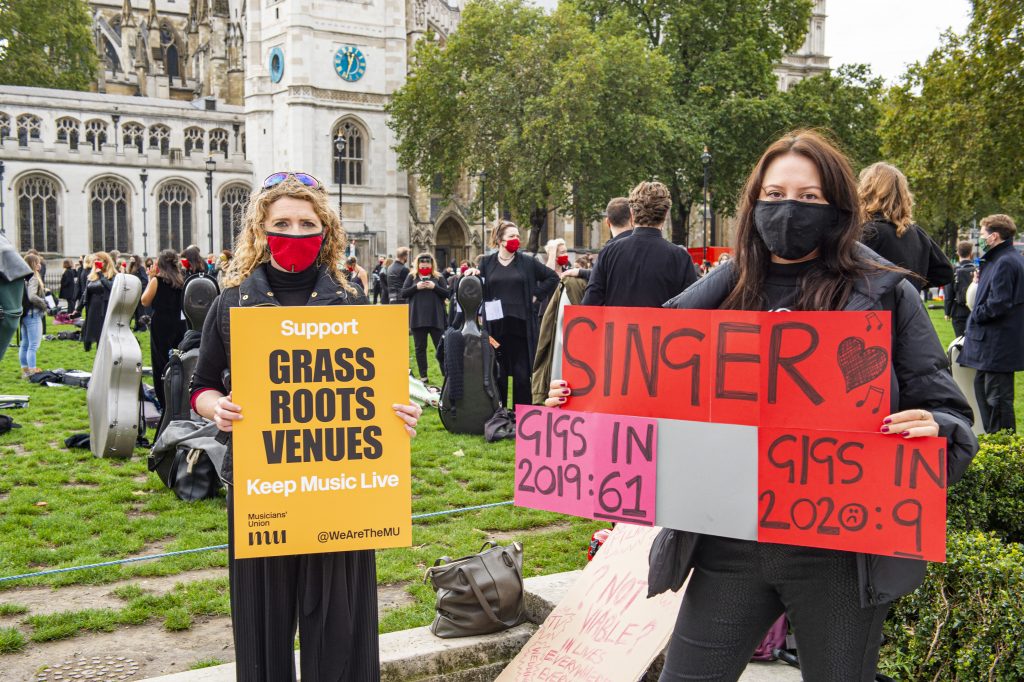
You collaboratively wrote a press release as part of the campaign. Talk me through your intentions and what you hoped to achieve with this
We spent a long time collaborating on how to get our specific message clear. It’s a very hard time for everyone, and we are definitely not asking for special treatment, quite the opposite. The art and culture industry contributes 10.8 billion to the economy as a whole, and the workforce is almost entirely self employed and freelance. We wanted to shine a light on the fact that each freelancer is a hardworking small business, contributing to the economy, and also that we are the destination. It’s not just the ticket sales that arts and entertainment generate for the economy. When someone goes to a concert or a gig, they also might go to a restaurant or sandwich bar beforehand and go to the pub afterwards or get a cab home etc. That economic stimulus is generated by going to the event. It’s easily overlooked because it is perhaps seen as something one could live without, but people are going to be so excited to go out to gigs and festivals again, it is a huge part of what will get the economy moving again – if we are still here! We need to have our infrastructure still in place for it to happen.
We also hoped to show that our professions were worthwhile, I think perhaps there is a bit of a misunderstanding about freelancing, especially in the arts. We make our own work and their own career and that means that we have to be extremely committed, flexible, and disciplined. Five MPs came down on the day, having heard us play and were wonderfully supportive. I think that our aim of starting the conversation has definitely happened, and I’m so grateful for that.
You mention this ‘misunderstanding of the creative industries,’ do you feel that the way freelancers are being treated is perhaps part of a wider perception of the Arts?
Perhaps; I think there can be a perception that the music profession is made up of people either trying to “make it”, or wildly famous! In reality we are hundreds of thousands of people that play an instrument as an everyday living, 78% of musicians earn less than £30,000 per year and the average income is around £23,000. It is a highly specialized profession, and takes many years of hard training but it is also just a normal job that you go and do every day.
Music is an integral part of everyday life, the Cellist playing you down the aisle at your wedding could be on X Factor on a Saturday night, in the pit of Les Misérables, the string section for Michael Bublé, and recording the soundtrack for The Crown, all in the same week. To be able to do all those things requires a lifelong dedication to train and practice. You have to commit to it from childhood, or you won’t technically be able to get there, it is almost like being an Athlete in that sense.
What’s next for the campaign then?
We have plans for online content and keeping the conversation going, most importantly to highlight the fact that there are so many that are still excluded from any help. Over a third of professional Musicians are among the 3 million people who have not been eligible for support of any kind this year. We are also hoping to organise a socially distanced, outdoor benefit concert at some point, when it is safe to do so!
It would be wonderful to see the Government engage with us like they have done with other industries, and make much clearer guidelines around teaching and performance, so that we can adapt and survive.
If you want to get involved with the campaign or hear more about it, follow #LetMusicLive on Social Media or email letmusicliveuk@gmail.com
Facebook: https://www.facebook.com/letmusicliveuk/
Instagram: https://www.instagram.com/letmusicliveuk/?hl=en
Twitter: https://twitter.com/letmusicliveuk?lang=en
Words by Hermione Kellow
Photos © Jonathan Stewart
